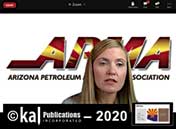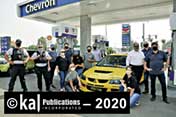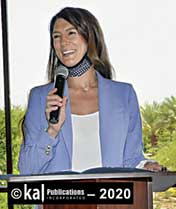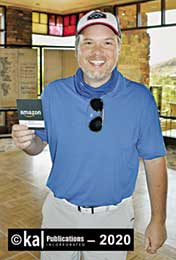
November 2020 Issue Highlights
For more complete coverage, send us an e-mail to
request a back
issue.

For more complete coverage, send us an e-mail to
request a back
issue.

Arizona Petroleum Marketers Association Virtual Convention

Boyett Petroleum "Make Dreams Real" Charity Golf Tournament

Pearson Fuels 200th Station




Nevada Petroleum Marketers & Convenience Store Association "Big Dogs Shootout"
Want to see the photos that didn't make the issue? Check out the Cutting Room Floor.
California
Governor Orders End of Gasoline and
Diesel-Powered Vehicles by 2035
Conviction of
Pilot Flying J Execs Overturned
Global,
ExxonMobil Sign Renewable Diesel
Supply Deal
Oregon DEQ
Approves Transloading Renewable Diesel
at Columbia River Terminal
Pritzker
Private Capital Acquires Warren
Distribution
SACRAMENTO, CA. — California Governor Gavin Newsom has issued what can only be called a controversial Executive Order at the end of September, requiring all new passenger cars and trucks sold in the state to be zero-emissions by 2035, effectively banning the sale of new gasoline and diesel-powered automobiles.
As an Executive Order, the mandate to ban traditional internal combustion engines in California was not approved by the Legislature or by the voters.
Newsom said he was issuing the order to help tackle the issue of climate change.
"Of all the simultaneous crises that we face as a state," said Newsom, "none is more forceful than the issue of the climate crisis." He added, "What we're advancing here today is a strategy to address that crisis head-on, to be as bold as the problem is big."
The Executive Order instructed the California Air Resources Board (CARB) to draft regulations requiring that all new cars and passenger trucks sold in the state be zero-emissions in the next 15 years.
The order also says that "where feasible" medium- and heavy-duty trucks and equipment should be 100% zero-emissions by 2045.
Newsom also called on state agencies to speed up development of EV charging stations.
Once drafted, CARB's proposed regulations will be subject to a lengthy regulatory process, including legal, economic, and environmental analyses, public comment and hearings.
The Governor's order is also expected to face numerous legal challenges from opponents.
According to the California Energy Commission, zero-emission vehicles (ZEVs) currently make up 2% of the over 28 million vehicles in use in California. The CEC estimated that 8% of new vehicle sales in California would be ZEVs and plug-in hybrids by 2025.
California already requires automakers to make sure a percentage of their sales in California be EVs or risk losing their ability to sell vehicles in the state.
Immediately following the Order, the U.S. Environmental Protection Agency (EPA) questioned the feasibility of the plan.
"California's record of rolling blackouts—unprecedented in size and scope—coupled with recent requests to neighboring states for power begs the question of how you expect to run an electric car fleet that will come with significant increases in electricity demand, when you can't even keep the lights on today," wrote EPA Administrator Andrew Wheeler in a letter to Governor Newsom.
California has endured a series of rolling blackouts that have affected the entire state this summer as electrical power generation and infrastructure could not meet the state's demand. These shortages were happening with only a small number of electrical vehicles pulling energy from the grid.
California's blackouts have been so severe in 2020 that the state has had the third largest number of days without power to citizens, following only Louisiana and Texas which were hit with multiple hurricanes and tropical storms this year to cause their blackouts.
Needless to say, consumer and business groups have already come forward against the executive order while many more aggressive environmental groups have praised the action.
One of the first to respond was the California Fuels and Convenience Alliance. James Allison, head of Public Affairs for CFCA, came out in strong opposition, noting the electrical infrastructure issues and the social justice implications of the mandate. Allison noted, "This order not only represents an egregious transgression of the legislative process, but also an outright disregard for the millions of Californians struggling to just get by in today's most taxing of circumstances.
"As Californians continue to be barraged by an endless wave of public service announcements urging stark energy conservation for fear of rolling blackouts, the timing for announcing the greatest additional stress to our grid in history could not be worse.
"Simply put, our power grid does not have the capacity to bear the weight of carrying one of the largest personal transportation sectors in the world. California already cannot meet its own energy demand without widespread EV adoption.
"Most importantly, electric vehicles leave behind California's most vulnerable populations. Even with hundreds of millions of dollars in state and federal subsidies, even the cheapest of EV's remain firmly out of reach for many working class Californians. Moreover, EV's become an even greater burden for renters and those living in apartments or multiple family housing, where access to sufficient home charging is simply not possible."
In the beginning of October, the CFCA met with Governor Newsom's staff to discuss the impact of the executive order. "Despite failing to reach out to industry representation prior to issuing the order, Newsom's office was eager for insights from our industry and the feasibility of a transition from liquid petroleum fuels," noted the CFCA.
"Our representatives gave insights into the thousands of small businesses that would be impacted by this order, and demonstrated the difficulties in transitioning to an all zero-emission vehicle future. The Governor's office was extremely receptive to alternative fuels, like hydrogen and expressed a great interest in biomass fuels, as well.
"While the direction preferred by the Newsom administration is evident, they were clear in that petroleum fuels will continue to play an important role in our state, and acknowledged the future will entail a multi-fuel solution.
"Interestingly, Newsom's representatives were also quick to admit a lack of guidance in how these objectives would be met, as well as a concern over power generation in the future," concluded the CFCA.
"SEMA is deeply disappointed in Governor Newsom's decision to escalate his ongoing feud with the Trump Administration at the expense of the consumer and California's small businesses," said Daniel Ingber, vice president of government and legal affairs for the Specialty Equipment Market Association, representing the $46.2 billion specialty automotive industry. "SEMA will work with the industry and enthusiasts in opposing the Governor's proposal on all fronts."
Wayne Nastri, executive officer for the South Coast Air Quality Management District, supports the Order, noting that he did not believe it went far enough. He stated, "We are pleased to see Governor Newsom's announcement to move California's passenger and cargo transportation systems towards a zero-emission future."
"On-road and off-road vehicles make up more than 80 percent of the emissions that contribute to smog in Southern California, with the majority of that coming from heavy-duty diesel engines. Moving towards cleaner cars is important but cleaning up the freight sector is crucial to meeting clean air deadlines that are arriving much earlier than 2035 or 2045. We look forward to working with the Governor and the state agencies to help not only implement his vision, but to accelerate the transition to cleaner vehicles in our region in time to meet our clean air goals."
Governor Newsom's actions in California may soon affect other Western states. When the Executive Order was issued, Oregon Governor Kate Brown Tweeted her praise for the action and wrote "I will do all I can to accelerate electrification here."
KNOXVILLE, TN. — The conviction of three former Pilot Flying J executives has been overturned by the U.S. Court of Appeals.
In the original decision, handed down in February 2018, Mark Hazelwood, former Pilot Flying J president, and former account representative Heather Jones were found guilty of conspiracy to commit wire fraud and mail fraud. Hazelwood was also convicted of wire fraud and witness tampering. Scott "Scooter" Wombold, former company vice president, was convicted of one count of wire fraud.
The case began in April 2013, with an FBI raid at the Pilot Flying J headquarters in Knoxville, TN., investigating fraud charges stemming from the company's fuel rebate program. Eventually Hazelwood, Jones, and Wombold stood trial; 14 other former Pilot Flying J employees pleaded guilty to charges and did not have to go to trial as part of their plea bargain.
In the latest chapter of the saga, the judges on the U.S. Court of Appeals for the Sixth Circuit in Cincinnati ruled that jurors should not have been played secret recordings of Hazelwood that included racial slurs, profanity, and criticizing his boss' football team and fans.
"The district court admitted the recordings on the theory that if the defendant was reckless enough to use language that could risk public outrage against the company, he was a 'bad businessman,' and as a bad businessman, he was also reckless enough to commit fraud," Judge Richard Suhrheinrich wrote for the majority. "This is vintage bad character evidence — and precisely the type of reasoning the Federal Rules of Evidence forbid."
"I am extremely gratified that the Sixth Circuit rectified the injustice of my conviction," stated Hazelwood following the decision. "I vow to fight on to clear my good name and reputation, as I am innocent of these charges. I want to thank God, my incredible family and friends for their unwavering support and belief in my innocence, and my strong appellate team."
BAKERSFIELD, CA. — ExxonMobil has signed an agreement with Global Clean Energy Holdings to purchase 2.5 million barrels of renewable diesel per year for five years.
ExxonMobil plans to distribute the renewable diesel within California and potentially to other markets.
The renewable diesel will be sourced from Global's refinery in Bakersfield, California, which is currently being retooled to produce renewable diesel. The facility is expected to come on line in 2022.
The refinery will use non-petroleum feedstocks to produce the diesel, including camelina, a dryland farmed rotation crop that does not displace food crops.
"Our agreement with Global Clean Energy builds on ExxonMobil's longstanding efforts to develop and offer products that help meet society's energy needs while reducing environmental impacts," said Bryan Milton, president of ExxonMobil Fuels and Lubricants Company, announcing the deal. "Chemically similar to petroleum-based diesel, renewable diesel can be readily blended for use in engines on the market today."
According to Global, once production begins in 2022, the Bakersfield biorefinery will be the only integrated farm-to-tank renewable diesel producer of its kind, processing both camelina as well as traditional biofuel feedstocks such as plant oils and waste products.
CLATSKANIE, OR. — Global Partners has received approval from the Oregon Department of Environmental Quality to add renewable diesel to its transloading permit for the Clatskanie, OR., terminal.
This was the last regulatory hurdle before Global could begin transloading renewable diesel at its rail- and ship-capable facility on the Columbia River.
"We are thrilled to have received the permit from Oregon DEQ and look forward to transloading renewable diesel," said Eric Slifka, CEO of Global Partners, adding, "We believe that our strategic assets are well positioned to move the low-carbon fuels of the future."
Earlier this year, Global announced plans to receive, store and ship renewable diesel through their Oregon terminal, with capacity for 1.8 billion gallons a year. With the Oregon DEQ approval, Global has signed a long-term contract for handling the product and plans to start receiving renewable diesel this fall.
"With this permit modification, our ability to handle a portfolio of products, including advanced biofuels, is enhanced," said Dylan Remley, senior Vice President of Terminal Operations for Global. "Since 2016, the facility has been storing and handling ethanol. The addition of renewable diesel provides further capabilities and opportunities for the biofuels marketplace, which is driven by West Coast low-carbon fuel standards."
OMAHA, NB. — Warren Distribution, one of the largest private label blenders and one of the largest independent motor oil, lubricants and automotive chemicals manufacturers and suppliers in North America, has been acquired by Pritzker Private Capital (PPC).
The acquisition by the investment company was announced in October and is expected to close by the end of 2020.
When the sale closes, the combined company will have 27 facilities across North America and more than 22,000 SKUs, including engine lubricants, windshield washer fluid, "and a wide variety of consumable automotive aftermarket products."
The deal was a complex one involving several holding companies. The Warren assets were linked with Highline Aftermarket Holdings, LLC, which was majority owned by The Sterling Group, and Warren Distribution, Inc. Highline Aftermarket is national distributor of automotive products, with 15 distribution centers and more than 500 employees.
PPC and its co-investors are investing alongside members of the Highline and Warren management teams to complete the sale of the assets.
Warren was majority-owned by Bob Schlott, who served as Warren's Chairman and CEO. Schlott, whose family founded Warren in 1922, will remain as a board advisor when the deal closes.
Darcy Curran, who had been serving as CEO of Highline, will lead the combined business.
"We are excited to partner with Bob Schlott and the team at Warren Distribution as we continue to grow our great businesses," said Curran, announcing the deal. "Together we'll strive to be the best company to work for, buy from and sell to in the automotive aftermarket."
"For nearly 100 years, Warren has been a leader in private label lubricants and I believe the combination with Highline represents an exciting new chapter in Warren's long history," stated Schlott.
Speaking for PPC, Michael Nelson, head of investing, added, "We are thrilled to partner with Darcy, Bob and the Highline and Warren teams in building this exciting combination for long-term success. As a leading supplier for the automotive aftermarket, the combined company has tremendous opportunities for growth, both through organic initiatives and acquisitions."
Originally published in the
November 2020 issue of O&A
Marketing
News.
Copyright 2020 by KAL Publications Inc.
Serving the 13 Western States, the World's Largest Gasoline, Oil, Fuel, TBA and Automotive Service Market